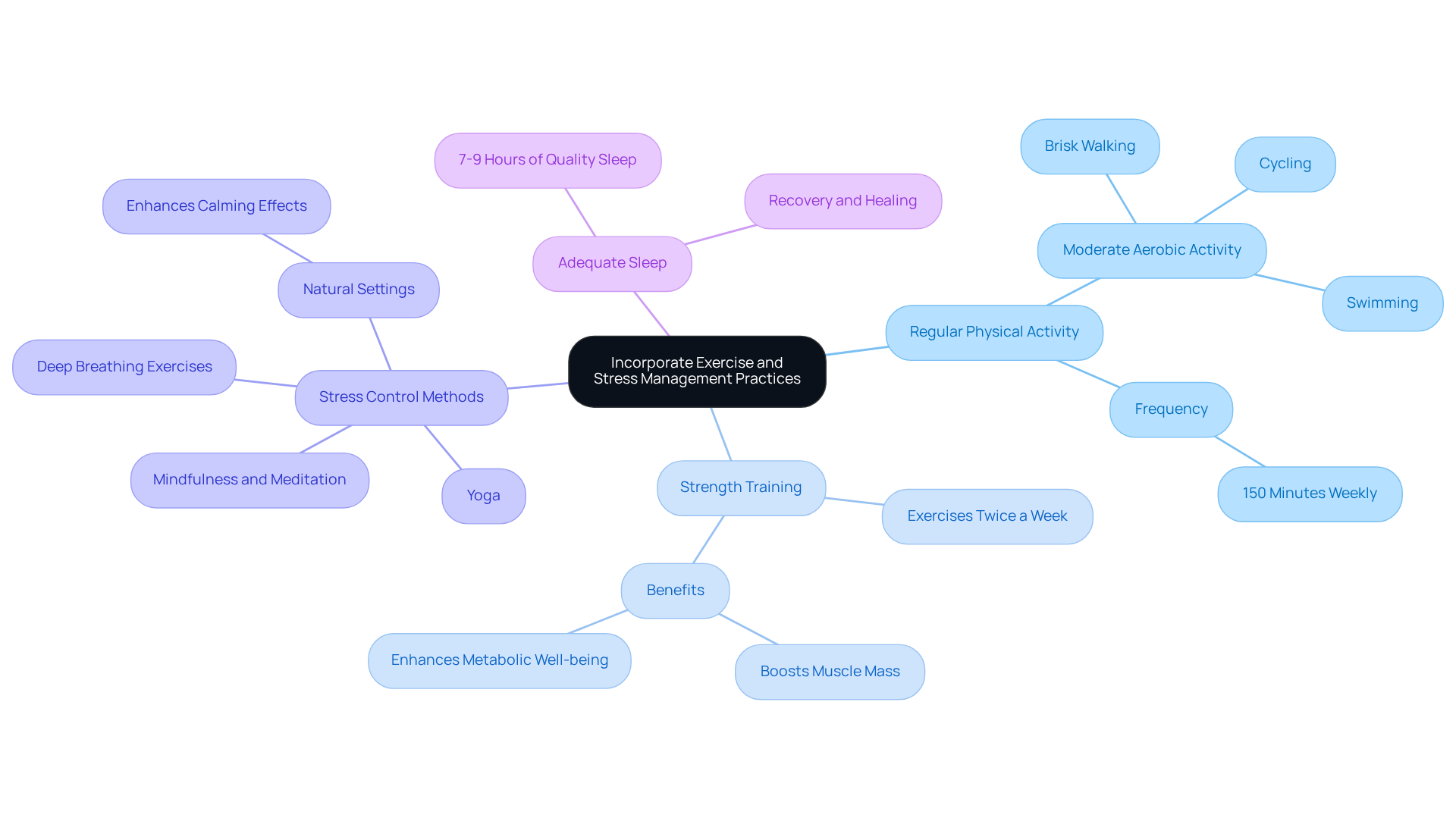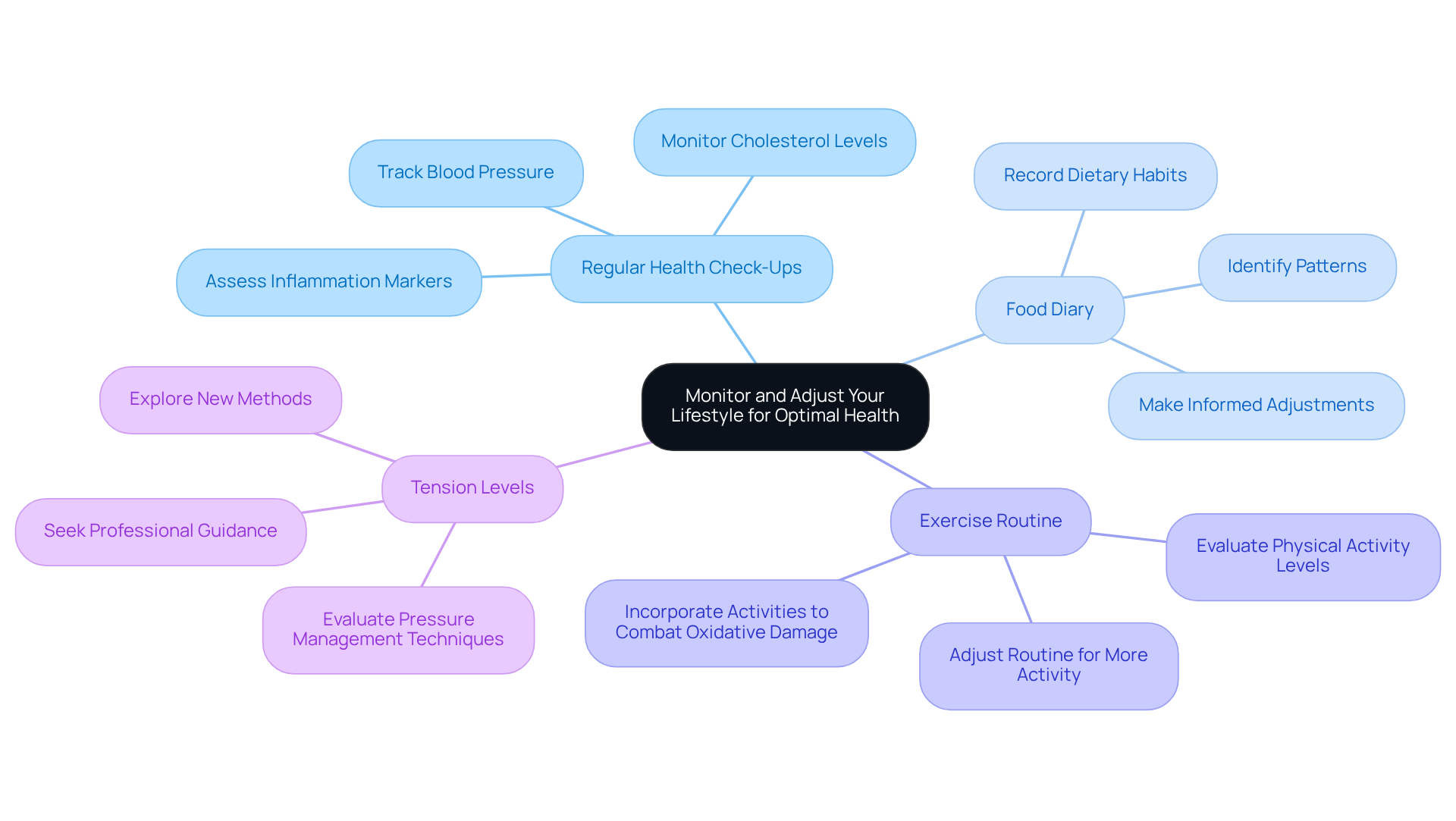4 Steps to Reduce Oxidative Stress for Better Health
Overview
To reduce oxidative stress for better health, individuals can implement dietary changes, engage in regular physical activity, and adopt effective stress management practices. This article outlines these strategies, emphasizing the importance of antioxidant-rich foods, consistent exercise, and mindfulness techniques. Together, these elements work to combat cellular damage and promote overall well-being.
Have you considered how your diet impacts your health? By incorporating more antioxidant-rich foods, you can significantly enhance your body’s ability to fight oxidative stress. Consistent exercise not only boosts your physical health but also contributes to mental clarity and emotional resilience. Furthermore, mindfulness techniques can help you manage stress effectively, creating a holistic approach to wellness.
In conclusion, adopting these strategies can lead to improved health outcomes. Explore further resources to learn more about how to implement these changes in your daily routine.
Introduction
Understanding the delicate balance between free radicals and antioxidants is essential for maintaining optimal health. Oxidative stress, a condition resulting from this imbalance, has been linked to numerous chronic diseases and accelerated aging. This article delves into actionable steps to reduce oxidative stress. By exploring dietary changes, exercise, and lifestyle adjustments, individuals can empower themselves to enhance their well-being. But what specific strategies can one implement to effectively combat this pervasive threat to health? Exploring these methods may hold the key to a healthier, more vibrant life.
Understand Oxidative Stress and Its Health Implications
Oxidative strain occurs when there is an imbalance between free radicals and antioxidants in the body. Free radicals are unstable molecules that can harm cells, proteins, and DNA, resulting in various problems, including chronic illnesses and accelerated aging. Antioxidants, on the other hand, are substances that neutralize these harmful free radicals. Frequent reasons for cellular damage include:
- Environmental pollutants
- An unhealthy diet
- Lifestyle elements such as smoking and excessive alcohol intake
Understanding these implications is crucial for acknowledging the significance of controlling cellular damage to enhance longevity and overall well-being, as it can help reduce oxidative stress.
Chronic cellular damage is associated with serious health implications, such as cancer, heart diseases, and neurodegenerative conditions. By comprehending cellular damage, you can better appreciate the importance of taking subsequent measures to reduce oxidative stress and mitigate its impact on your health. What steps can you take today to protect your body from oxidative strain? Exploring resources on nutrition and lifestyle changes can empower you to make informed decisions for a healthier future.

Implement Dietary Changes to Combat Oxidative Stress
To effectively combat oxidative stress through diet and supplementation, consider these essential steps:
Increase Antioxidant-Rich Foods: Incorporate a variety of fruits and vegetables, particularly those high in vitamins C and E, selenium, and flavonoids. Examples include:
- Berries (blueberries, strawberries)
- Dark leafy greens (spinach, kale)
- Nuts and seeds (almonds, sunflower seeds)
- Spices (turmeric, cinnamon)
Limit Processed Foods: Decrease consumption of processed foods, sugars, and trans fats, which can elevate cellular damage. Instead, focus on whole, nutrient-dense foods that nourish your body.
Stay Hydrated: Consuming ample water is crucial to aid cellular activities and assist in eliminating toxins that lead to cellular imbalance.
Consider Supplementation: If necessary, explore dietary supplements like vitamin C, vitamin E, or coenzyme Q10, which can provide additional antioxidant support. These supplements come in various forms, including pills, capsules, powders, and liquids, designed to complement a healthy diet by filling potential nutrient gaps and addressing specific nutritional needs. Always consult with a healthcare provider before starting any new supplements.
By implementing these dietary modifications and considering the appropriate supplements, you can significantly reduce oxidative stress and cellular damage while enhancing your overall well-being. This aligns with ByKomi’s dedication to offering extensive resources for anti-aging nutrition and cutting-edge therapies.

Incorporate Exercise and Stress Management Practices
Incorporating regular physical activity and effective stress management techniques can significantly reduce oxidative stress. Here’s how to implement these strategies:
Regular Physical Activity: Aim for at least 150 minutes of moderate aerobic activity weekly, such as brisk walking, cycling, or swimming. Consistent physical activity not only enhances the body’s antioxidant defenses but also helps to reduce oxidative stress and inflammation, leading to overall well-being. Insights from Dr. Dituri’s underwater research indicate that alternative environments may enhance these benefits, potentially leading to new anti-aging therapies.
Strength Training: Incorporate strength training exercises at least twice a week. This practice boosts muscle mass and metabolic well-being, further countering oxidative damage and helping to reduce oxidative stress, which encourages longevity. Dr. Dituri’s findings suggest that physical activity in unique environments could amplify these effects, offering exciting possibilities for future health interventions.
Stress Control Methods: Employ mindfulness, meditation, or yoga to reduce hormone levels associated with tension. Methods such as deep breathing exercises can effectively reduce oxidative stress by promoting relaxation and mental clarity. Engaging in these practices in natural settings, akin to those explored in Dr. Dituri’s research, may enhance their calming effects.
Adequate Sleep: Prioritize 7-9 hours of quality sleep each night. Restful sleep is essential for recovery and contributes significantly to reducing oxidative stress, enabling the body to heal and restore.
By incorporating these habits into your daily routine, you can strengthen your resilience against harmful effects and improve your overall well-being. The case analysis named ‘Exercise as Medicine’ emphasizes that beneficial outdoor exercise is the finest remedy for both body and spirit, underscoring the significance of these approaches in enhancing well-being and longevity.

Monitor and Adjust Your Lifestyle for Optimal Health
To effectively manage oxidative stress and promote overall health, consider implementing the following strategies:
-
Regular Health Check-Ups: Arrange regular visits with your healthcare professional to track important health indicators associated with cellular damage, including blood pressure, cholesterol levels, and inflammation markers. Regular assessments can help identify potential issues early, allowing for timely interventions.
-
Keep a Food Diary: Maintain a detailed record of your dietary habits to uncover patterns and areas for improvement. This practice fosters accountability and enables you to make informed adjustments to enhance your nutritional intake.
-
Assess Your Exercise Routine: Regularly evaluate your physical activity levels. If you find that you are not meeting your exercise objectives, consider adjusting your routine to include more activity, as it is crucial for combating oxidative damage and can help reduce oxidative stress while promoting healthy aging.
-
Reflect on Tension Levels: Take time to evaluate your pressure management techniques. If certain strategies are ineffective, explore new methods or seek professional guidance to develop a more effective approach to alleviating tension.
By actively monitoring and adjusting these aspects of your lifestyle, you can optimize your health and effectively reduce oxidative stress over time.

Conclusion
Reducing oxidative stress is essential for enhancing health and longevity. By understanding the balance between free radicals and antioxidants, individuals can take proactive steps to mitigate cellular damage and its associated health risks. This guide emphasizes the importance of dietary changes, regular physical activity, effective stress management, and lifestyle monitoring as foundational strategies to combat oxidative stress and promote overall well-being.
Key actions include:
- Incorporating antioxidant-rich foods
- Limiting processed items
- Staying hydrated
- Engaging in both aerobic and strength training exercises
Additionally, managing stress through mindfulness practices and ensuring adequate sleep are vital components of a holistic approach to health. Regular health check-ups and self-assessment tools like food diaries can further empower individuals to track their progress and make informed adjustments.
In conclusion, taking charge of oxidative stress not only enhances individual health but also contributes to a more vibrant and resilient life. By adopting these strategies, individuals can significantly reduce their risk of chronic diseases and improve their quality of life. Embracing these changes is a powerful step toward a healthier future, inspiring others to prioritize their well-being and the importance of managing oxidative stress effectively.
Frequently Asked Questions
What is oxidative stress?
Oxidative stress occurs when there is an imbalance between free radicals and antioxidants in the body, leading to potential harm to cells, proteins, and DNA.
What are free radicals?
Free radicals are unstable molecules that can cause damage to cells, proteins, and DNA, contributing to various health problems, including chronic illnesses and accelerated aging.
What role do antioxidants play in the body?
Antioxidants are substances that neutralize harmful free radicals, helping to prevent cellular damage and reduce oxidative stress.
What are common causes of oxidative stress?
Common causes include environmental pollutants, an unhealthy diet, and lifestyle factors such as smoking and excessive alcohol intake.
What are the health implications of chronic oxidative stress?
Chronic oxidative stress is associated with serious health issues, including cancer, heart diseases, and neurodegenerative conditions.
Why is it important to manage oxidative stress?
Managing oxidative stress is crucial for reducing cellular damage, which can enhance longevity and overall well-being.
What steps can individuals take to reduce oxidative stress?
Individuals can explore resources on nutrition and lifestyle changes to make informed decisions that help protect their bodies from oxidative stress.






